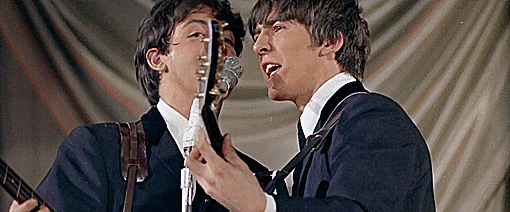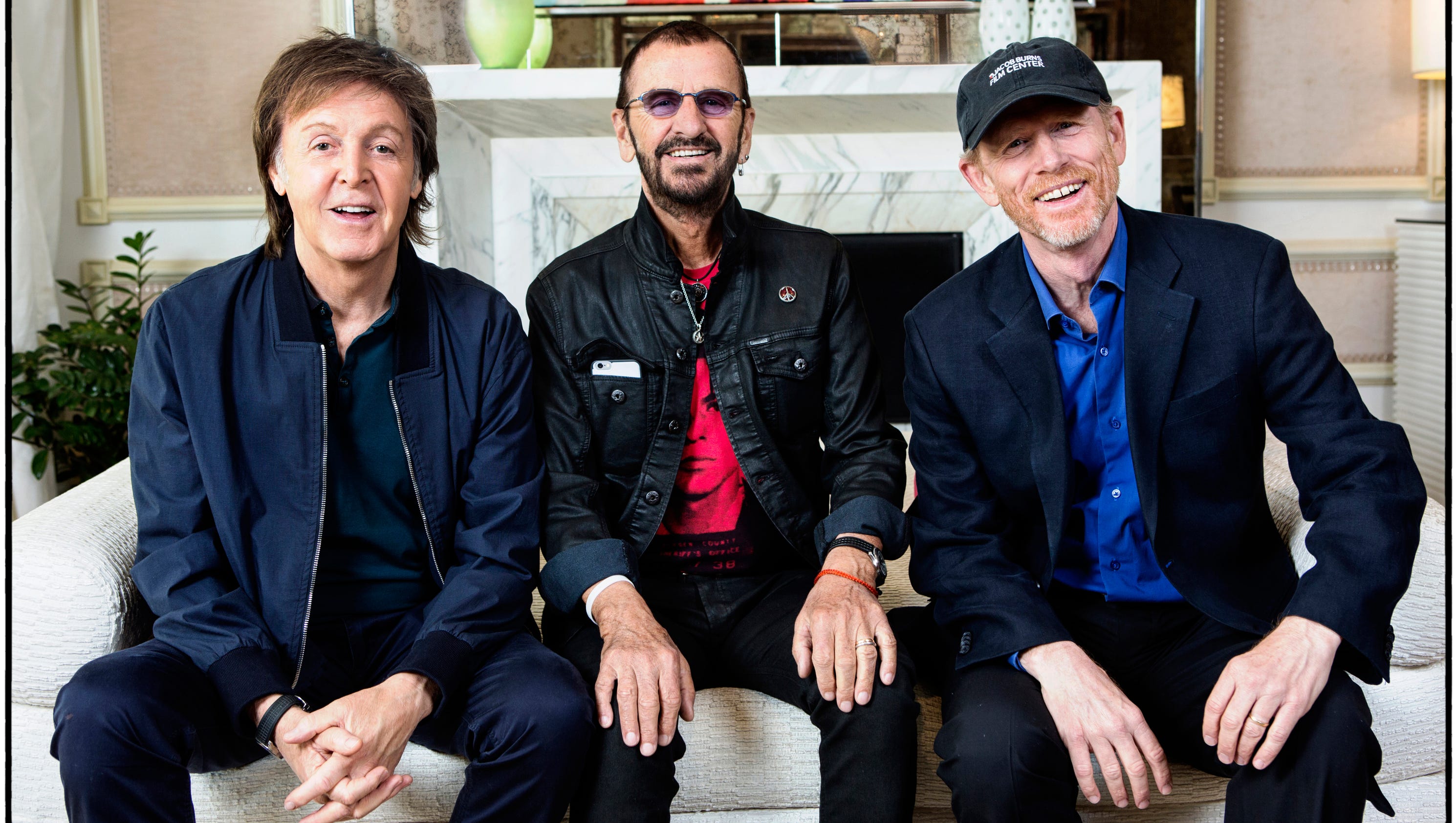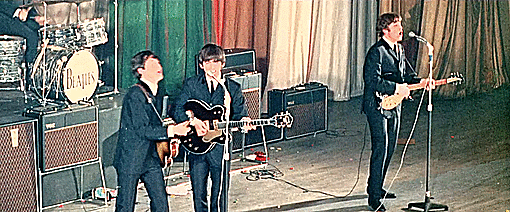
www.bostonglobe.com
Ron Howard follows the Beatles on tour
By Ty Burr
GLOBE STAFF
SEPTEMBER 14, 2016

The Beatles in Coventry, England, in November 1963, from Ron Howard’s “Eight Days a Week — The Touring Years.”
APPLE CORPS LTD. PHOTOS
What do you get the Beatlemaniac who has everything? I’ve always said that that would be Tim Riley’s absurdly readable 1988 book, “Tell Me Why,” which breaks down every single song the band ever recorded. But maybe that’s changed now that we have “The Beatles: Eight Days a Week — The Touring Years,” a documentary labor of love about the Fab Four that comes from Ron Howard, of all people.
The movie will seem as much a marvel to the casual Beatle fan, of course. And, now that I think of it, “Eight Days a Week” may be best for younger viewers who know the group only as a rumor on the receding horizon. Take the kids and watch their little minds get blown.

Ron Howard and The Beatles
It’s a long, jangling, melodious soak, rich with backstage incident and wall-to-wall hits, and it gives us a front-row seat at the most important pop explosion of the 20th century while showing how that explosion changed the four men at its center. “We just wanted to play; playing was the important thing,” says John Lennon in an archival interview at the film’s start. “Eight Days a Week” reminds us that global adoration — i.e., us — made touring impossible and forced the Beatles into the studio full time, where they created both their best and most self-indulgent work, the two sometimes indistinguishable.
Because it’s Ron Howard directing and not some pisher, we have Paul McCartney and Ringo Starr pulling up easy chairs and telling the camera how it happened, and the late Lennon and George Harrison are present in older interviews as well. Making “Eight Days a Week” clearly involved tactful negotiations among various parties and estates and historical agendas, so what you don’t get from the movie is dirt. It’s rock ’n’ roll without the sex and hardly any drugs. But it’s also true that only four men ever knew what it was like to be a Beatle, and this may be the closest we’ll get to hearing from all of them at once.

Howard skips the early days and starts with the initial chart detonations in England in early 1963, looping back to remind us that the Beatles had been gigging for years and only seemed to have arrived fully formed, able to synthesize at will multiple aspects of rock and pop. From there, the movie moves forward on a timeline that will be familiar to anyone who knows the history: The landing at New York’s John F. Kennedy International Airport, the press conferences, the “Ed Sullivan” appearances, the two movies, and so on, into the middle 1960s.
What makes “Eight Days a Week” such a blast is the focus on live performance, including TV broadcasts and touring footage many of us have never seen before. The movie captures, or freshly recaptures, the cultural madness surrounding the Beatles in those early days — how they suddenly mattered more than anything in the culture had ever mattered, and on a global scale. Howard puts us back at the center of the noise, and the sheer intensity of the release is stunning all over again.

Psychologically, that release meant a generation was free from parental notions of who to be and how to behave. “Eight Days a Week” features some truly odd talking heads, but the oddest and most affecting may be Whoopi Goldberg, who talks of hearing the Beatles as a child during the era of the Kennedy assassination and the civil rights struggle. “The whole world lit up,” she recalls. “I felt I could be friends with them, and I’m black. . . . The idea was that everybody was welcome.”
In one wonderfully disorienting moment, actress Sigourney Weaver remembers seeing the group perform at the Hollywood Bowl in August 1964 — “I felt as much as a girl can feel,” she says — and there in the archival crowd footage we glimpse the 14-year-old Weaver herself, eyes shining with joy.
The physical side of the release, of course, was the screaming. “Eight Days a Week” reminds us with gale force what 20,000 teenage girls sound like when they’re having an out-of-body experience. This and the general dehumanization of world touring is what soured the Beatles on live performance: They simply could not hear themselves. Ringo talks of playing drums during the Shea Stadium concert of Aug. 15, 1965, and only being able to keep time by following the waggling of Lennon’s behind.
(And yet: After the end credits, “Eight Days a Week” tacks on a 30-minute cut of the 50-minute Shea concert with the screams mixed down and the sound cleaned up, and it sounds fantastic. The band is tight as hell, the harmonies are sharp and in tune, and Lennon howls the early hits as if they were talismans from his youth. There were no stage monitors and the sound system was the stadium’s tinny PA speakers, yet the group plays without a hint of uncertainty. That’s how good they were.)
By the following year, darkness was descending. The 1966 tours were dogged by aggressive journalists and protests over Lennon’s “We’re more popular than Jesus” comment. There were record burnings and death threats; youth culture was growing out in different directions. The group wanted to make music it couldn’t play live, like Lennon’s mind-bending “Tomorrow Never Knows,” the capstone of what may be their finest album, “Revolver,” and still one of the goddamnedest things I’ve ever heard.
The final show, on Aug. 29, 1966, in San Francisco’s Candlestick Park, was a bust; less than two-thirds of the tickets were sold (a fact the film doesn’t tell us), and the group was taken back to their hotel in a meat wagon. George spoke for all of them that night when he said Enough.
“Eight Days a Week” is brilliantly edited (by Paul Crowder), and at this point it leads us up to the edge of “Sgt. Pepper” — “I got the idea for us all to be someone else,” McCartney recalls of the group’s general exhaustion — and then jumps ahead three full years to the next and final Beatles concert, on the roof of the Apple offices in London, in January 1969.
It’s a diplomatic but moving transition, banishing a period of increasingly bad vibes in the culture and among the Beatles while bringing John and Paul together one last time to sing “I’ve Got a Feeling.” A cutaway to the streets lets us glimpse a band far above the heads of the crowd, happy and unreachable. Howard’s movie reminds us that it was us who put them there.

★★★½
THE BEATLES: EIGHT DAYS A WEEK — THE TOURING YEARS
Directed by Ron Howard. Written by Mark Monroe. Starring John, Paul, George, and Ringo; Whoopi Goldberg, Elvis Costello, Malcolm Gladwell. At Coolidge Corner. 137 minutes. Unrated (as PG: a naughty word here and there).


No hay comentarios:
Publicar un comentario